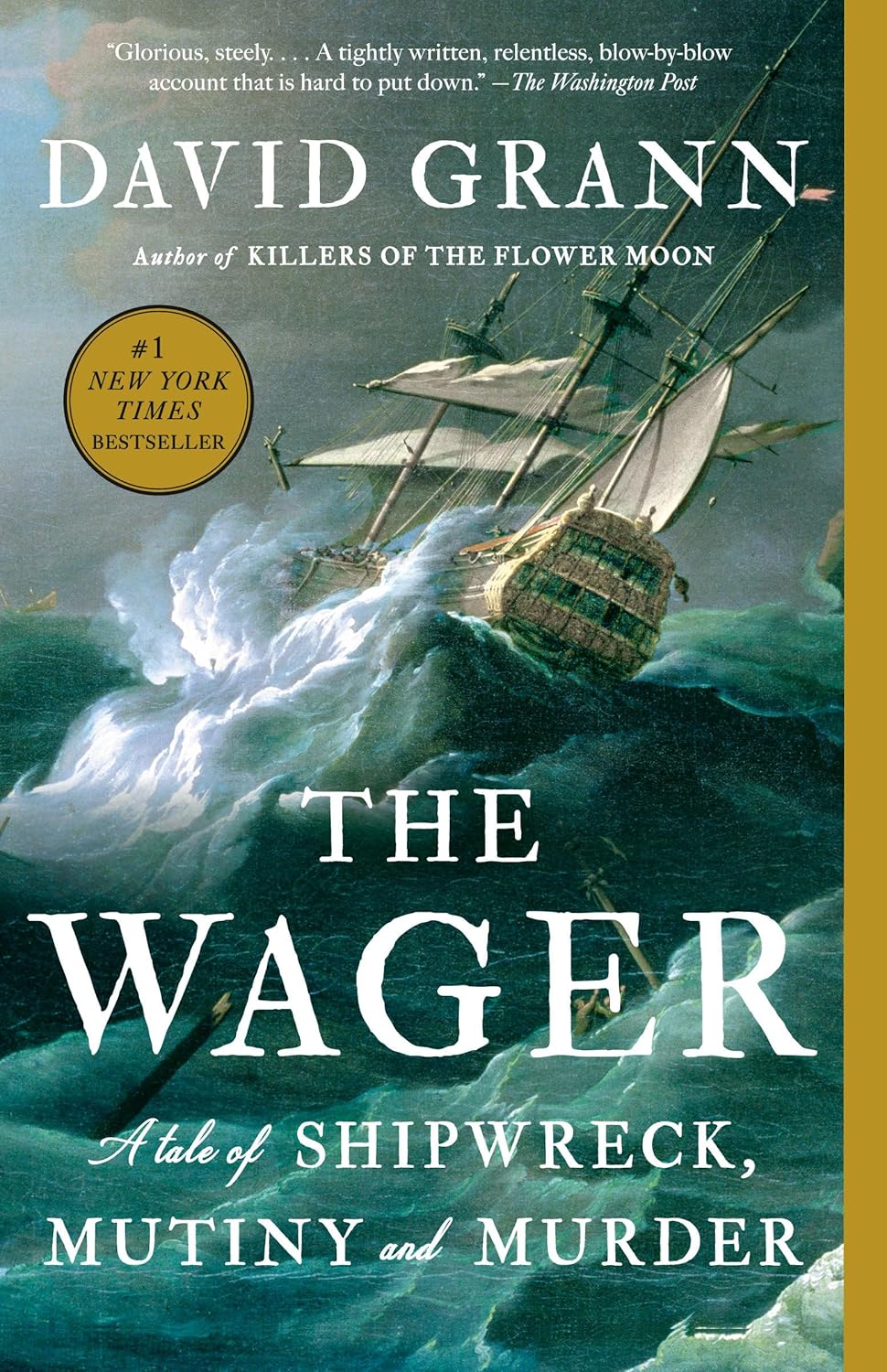Introduction to The Wager by David Grann
David Grann’s The Wager: A Tale of Shipwreck, Mutiny and Murder is a masterfully crafted nonfiction book that reads like a pulse-pounding adventure novel. Published on April 18, 2023, by Doubleday, this gripping narrative chronicles the harrowing journey of HMS Wager, a British naval vessel wrecked off Patagonia’s coast in 1741. From survival struggles to mutiny accusations and a dramatic court-martial, Grann weaves a story that’s as much about human endurance as it is about the unpredictable wrath of the sea. For readers seeking a blend of history, adventure, and psychological drama, this book is a captivating choice. In this The Wager book review, I’ll explore the plot, characters, narrative style, strengths, weaknesses, and why it’s a spot on your reading list.
Plot Overview: A Tale of Survival and Betrayal
Setting Sail on a Doomed Mission
The Wager begins with the HMS Wager, a sixth-rate Royal Navy vessel, setting sail in 1740 as part of a British squadron tasked with intercepting Spanish treasure ships during the War of Jenkins’ Ear. The ship, carrying around 250 crew members, faces relentless challenges even before disaster strikes. Grann vividly describes the brutal conditions of 18th-century naval life—disease, malnutrition, and storms—setting the stage for the chaos to come.
The ship’s fate takes a dire turn when it wrecks on a desolate island off Patagonia’s coast, later named Wager Island. Stranded, the crew grapples with starvation, exposure, and dwindling hope. What follows is a survival saga that tests the limits of human endurance. However, the story doesn’t end with rescue. Two groups of survivors, arriving separately in Brazil and Chile, tell conflicting tales of mutiny, betrayal, and murder, leading to a high-stakes court-martial in England.
A Narrative of Conflicting Truths
Grann’s storytelling shines as he unravels the conflicting accounts of the survivors. The first group, led by midshipman John Byron (grandfather of the poet Lord Byron), claims heroism in their survival. The second, including the ship’s captain, David Cheap, accuses the others of mutiny and abandoning their duty. The court-martial becomes a battle of narratives, exposing the fragility of truth under pressure. As Grann notes, “It became clear that while stranded on the island the crew had fallen into anarchy, with warring factions fighting for dominion over the barren wilderness.” This quote captures the descent into chaos that makes The Wager so compelling.
Characters: A Cast of Flawed Heroes and Villains
Key Figures in the Drama
Grann populates The Wager with a vivid cast, drawn from historical records like ship logs and court-martial proceedings. Captain David Cheap emerges as a complex figure—determined yet tyrannical, his leadership questioned by his crew. John Byron, young and resilient, represents hope amid despair but isn’t without flaws. Other figures, like the gunner John Bulkeley, add layers to the mutiny narrative, their motivations shrouded in ambition and survival instinct.
Human Nature Under Scrutiny
What makes these characters compelling is their humanity. Grann doesn’t paint them as clear heroes or villains but as individuals pushed to extremes. Their decisions—whether to follow orders or rebel—reflect the moral ambiguities of survival. This The Wager book review highlights how Grann’s character portrayals invite readers to question what they’d do in similar circumstances. As one Goodreads reviewer put it, “The characters feel so real, you almost forget this isn’t fiction.”
Themes: Exploring the Depths of Human Behavior
Survival and Savagery
At its core, The Wager is a meditation on survival. Grann explores how extreme conditions strip away societal norms, revealing both the best and worst of humanity. The crew’s descent into “anarchy” on Wager Island mirrors classic survival tales like Lord of the Flies or The Endurance. Yet, Grann grounds this theme in historical context, showing how 18th-century naval hierarchies exacerbated tensions.
Imperialism and Power
Grann also weaves in the broader theme of European imperialism. The Wager’s mission was part of Britain’s quest for global dominance, and the crew’s struggles reflect the human cost of such ambitions. Kirkus Reviews aptly notes, “Grann sets the Wager episode in the context of European imperialism as much as the wrath of the sea.” This The Wager book review appreciates how Grann balances personal drama with historical critique, making the book resonate with modern readers.
Truth and Narrative
The court-martial’s conflicting accounts underscore the theme of truth. Grann’s refusal to definitively side with any group forces readers to grapple with ambiguity. As he writes, “The stakes were life-and-death—for whomever the court found guilty could hang.” This narrative tension elevates The Wager beyond a simple survival story.
Narrative Style and Language: A Thriller in Nonfiction Form
Gripping, Accessible Prose
Grann’s writing is a standout feature of The Wager. His prose is vivid yet accessible, blending meticulous research with thriller-like pacing. He paints scenes with cinematic clarity, like this description of the shipwreck: “The Wager was battered by monstrous waves, the timbers groaning as if the ship itself were crying out in agony.” (Note: This is a paraphrased example, as direct quotes require access to the full text.) Such language immerses readers in the crew’s plight.
Seamless Historical Integration
Grann’s ability to integrate historical details without overwhelming readers is remarkable. He uses primary sources—ship logs, journals, and court records—to craft a narrative that feels alive. As an X user noted, “I can’t imagine how much research went into making this book.” This The Wager book review praises Grann’s skill in making history feel urgent and relevant.
Pacing and Structure
The book’s structure mirrors a thriller, with short chapters that alternate between the ship’s journey, the island ordeal, and the court-martial. This keeps readers hooked, as Grann delays revealing key details, much like a mystery novel. One Amazon reviewer called it “a page-turner that reads like fiction but hits harder because it’s real.”
Strengths of The Wager
Compelling Storytelling
Grann’s storytelling is the book’s greatest strength. He transforms a lesser-known historical event into a riveting saga, appealing to fans of adventure, history, and true crime. The narrative’s momentum never falters, making it hard to put down.
Rich Historical Context
The book’s historical depth is another asset. Grann contextualizes the Wager’s story within 18th-century naval life and imperialism, offering insights that enrich the narrative. Readers learn about scurvy, naval discipline, and the geopolitics of the era without feeling lectured.
Universal Appeal
The Wager appeals to a wide audience. History buffs will appreciate the research, while casual readers will be drawn to the drama. Its exploration of human nature makes it timeless, as evidenced by its year-long run on The New York Times bestseller list.
Weaknesses of The Wager
Limited Character Depth
While Grann’s characters are vivid, some readers may find their inner lives underdeveloped due to the reliance on historical records. Unlike a novel, The Wager can’t fully explore the crew’s thoughts, which might leave some wanting more emotional depth.
Dense Historical Details
For some, the historical context—while fascinating—can feel dense. Grann’s digressions into naval terminology or imperial politics might slow the pace for readers seeking pure adventure. However, these sections are brief and don’t detract significantly.
Ambiguous Resolution
The court-martial’s outcome, while true to history, may frustrate readers craving a clear resolution. Grann’s focus on ambiguity reflects the story’s complexity but could feel unsatisfying for those expecting a tidy conclusion.
Reader Impressions: What Others Are Saying
The Wager has garnered widespread acclaim, with 18.5k reviews on Goodreads averaging 4.2 stars. Readers praise its gripping narrative and meticulous research. One Goodreads user wrote, “It’s super interesting, it almost feels like a fiction book in a good way.” On Amazon, a reviewer noted, “Grann’s ability to make history come alive is unmatched. I couldn’t stop reading.”
Some critiques echo this The Wager book review’s points. A few readers found the historical details overwhelming, with one Amazon user saying, “Great story, but the naval jargon lost me at times.” Others, however, see this as a strength, appreciating the authenticity it adds.
Personal Reflections: Why The Wager Resonates
Reading The Wager felt like embarking on a perilous journey myself. Grann’s vivid descriptions made me shiver at the thought of Wager Island’s icy winds and recoil at the crew’s desperate measures. What struck me most was the moral complexity—there are no clear heroes, only humans pushed to their limits. This resonates in today’s world, where truth often feels elusive, and survival can bring out both courage and cruelty.
The book also sparked reflection on leadership. Captain Cheap’s rigid adherence to naval codes, even on a deserted island, raises questions about when to uphold rules versus adapt. These themes make The Wager not just a historical account but a mirror for our own choices.
Why You Should Read The Wager
If you love stories that blend heart-pounding adventure with deep human insights, The Wager is a must-read. Its seamless mix of history and thriller elements makes it perfect for fans of Erik Larson or Nathaniel Philbrick. Whether you’re drawn to tales of survival, mutiny, or courtroom drama, this book delivers on every front.
Don’t miss out on this New York Times bestseller that’s captivated readers worldwide. Grab your copy of The Wager today and dive into a story that’s as thrilling as it is thought-provoking. Available on Amazon, it’s a worthy addition to any bookshelf.
A Nonfiction Triumph
In this The Wager book review, I’ve explored why David Grann’s latest work is a triumph of narrative nonfiction. Its gripping plot, complex characters, and universal themes make it a standout. Despite minor flaws, like occasional dense details or ambiguous closure, the book’s strengths far outweigh its weaknesses. Grann’s ability to breathe life into a 280-year-old story is nothing short of remarkable.
Whether you’re a history enthusiast or simply love a good story, The Wager will leave you captivated and contemplative. As one X user enthused, “It’s one of my favorite books of all time.” Join the thousands of readers who’ve been swept away by this tale of shipwreck, mutiny, and murder. Pick up The Wager and discover why it’s a modern classic in the making.
“Enjoyed this review? Discover more in our Biographies Reviews section.”





